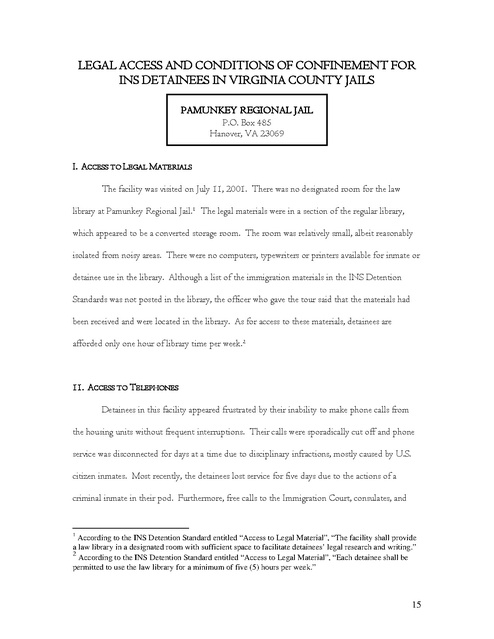INS Detention Standards Compliance Audit - Pamunkey Regional Jail, Hanover, VA, 2001
Download original document:

Document text

Document text
This text is machine-read, and may contain errors. Check the original document to verify accuracy.
LEGAL ACCESS AND CONDITIONS OF CONFINEMENT FOR INS DETAINEES IN VIRGINIA COUNTY JAILS PAMUNKEY REGIONAL JAIL P.O. Box 485 Hanover, VA 23069 I. ACCESS TO LEGAL MATERIALS The facility was visited on July 11, 2001. There was no designated room for the law library at Pamunkey Regional Jail. 1 The legal materials were in a section of the regular library, which appeared to be a converted storage room. The room was relatively small, albeit reasonably isolated from noisy areas. There were no computers, typewriters or printers available for inmate or detainee use in the library. Although a list of the immigration materials in the INS Detention Standards was not posted in the library, the officer who gave the tour said that the materials had been received and were located in the library. As for access to these materials, detainees are afforded only one hour of library time per week. 2 11. ACCESS TO TELEPHONES Detainees in this facility appeared frustrated by their inability to make phone calls from the housing units without frequent interruptions. Their calls were sporadically cut off and phone service was disconnected for days at a time due to disciplinary infractions, mostly caused by U.S. citizen inmates. Most recently, the detainees lost service for five days due to the actions of a criminal inmate in their pod. Furthermore, free calls to the Immigration Court, consulates, and 1 According to the INS Detention Standard entitled “Access to Legal Material”, “The facility shall provide a law library in a designated room with sufficient space to facilitate detainees’ legal research and writing.” 2 According to the INS Detention Standard entitled “Access to Legal Material”, “Each detainee shall be permitted to use the law library for a minimum of five (5) hours per week.” 15 pro bono legal service providers have been especially difficult. 3 Several requests for calls have to be made and responses frequently take up to one month. III. VISITATION There were no particular problems or concerns with general visitation, except that there are no scheduled hours on the weekend. 4 Non-legal visits are allowed Monday through Friday for six hours per day. As with Arlington, detainees in administrative or disciplinary segregation are not allowed visits from family or friends. One detainee said that he has not had visits from his family because the facility is too far for his family to travel for such a short visit. As for legal visitation, we discovered that detainees are being strip-searched after all contact visits, including those with attorneys. This type of blanket policy that prohibits contact visits with attorneys is of considerable concern because it interferes with access to counsel. 5 IV. RECREATION ISSUES Despite the liberal recreation schedule, which allows seven and a half hours of recreation per day, the detainees at Pamunkey expressed that the jail is understaffed and that their recreation time is often cut short. Furthermore, detainees often find themselves in lockdown due to a disciplinary infraction by one of the inmates in their pod and lose much of their recreation time. 3 According to the INS Detention Standard entitled “Telephone Access”, “Even if telephone service is generally limited to collect calls, the facility shall permit the detainee to make direct calls: (1) to the local immigration court and the Board of Immigration Appeals; (2) to the federal and state courts where the detainee is or may become involved in a legal proceeding; (3) to consular officials; (4) to legal service providers in pursuit of legal representation or to engage in consultation concerning his/her expedited removal case…” 4 According to the INS Detention Standard entitled “Visitation”, “The facility shall establish a visiting schedule based on detainee population and the demand for visits. Visits shall be permitted during set hours on Saturdays, Sundays, and holidays.” 5 According to the INS Detention Standard entitled “Visitation”, “if standard operating procedures require strip searches after every contact visit with a legal representative, the facility must provide an option for non-contact visits with legal representatives in an environment that allows confidentiality.” 16 V. MEDICAL ISSUES As compared with other facilities, the mental health services at Pamunkey appear to be lacking. Social workers from the Hanover Community Service Board come in twice a week and a psychologist comes in twice a month. There are no full-time or parttime counselors on staff. VI. RELIGIOUS ISSUES 6 The lack of non-Christian worship is of notable concern. There are religious services available six days a week; however, they are limited to Christian services. Religious counseling is available by request, but the visits are non-contact. VII. OTHER CONDITIONS ISSUES Of particular concern at Pamunkey is the policy for determining whether a detainee is indigent. Detainees who do not have money in their accounts are subject to a month waiting period before they are issued an indigent package. This is a relatively long wait compared with the other facilities. Furthermore, the detainees complained that the hygiene products issued in the indigent package would not last the month. For example, the package included only two hotel-size bars of soap. 6 According to the INS Detention Standard entitled “Religious Practices”, “Detainees of different religious beliefs will be provided reasonable and equitable opportunities to participate in the practices of their respective faiths. These opportunities will exist for all equally, regardless fo the number of practitioners of a given religion, whether their religion is ‘mainstream,’ whether the religion is ‘Western’ or ‘Eastern,’ or other such factors.” (Section 28.I). 17

